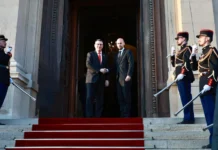For scholars and policy-makers, it will be best to examine Israel’s defense posture in theoretic terms. Succinctly, any such examination should acknowledge that the most conspicuous source of national power is an intimidating military arsenal, but that this source can never be relied upon per se. Because human beings generally regard personal death avoidance as more rewarding than any other preference, the highest form of power is never just a matter of tangible assets, strategy or tactics. It is “power over death.”
There are multiple ironies. By definition, the promise of immortality must be drawn from religious faith rather than science. Nonetheless, “whisperings of the irrational” have hardly ever impaired this promise as a factor in diplomacy or deterrence. More than likely, for assorted Islamist aggressors and terrorists, siding with anti-reason has proven pleasingly celebrated.
Israel’s jihadist enemies draw palpable power and purpose from a primal loathing of reason and rationality. If this power should ever be joined with weapons of mass destruction, most ominously with nuclear weapons, Israel could have to face the ultimate triumph of anti-reason. In any such unpredictable confrontation, the inherently illogical promise of “power over death” could prove determinative. Credo quia absurdum, said the ancient Roman philosopher Tertullian: “I believe because it is absurd.”
In Jerusalem, to protect national survival, more detailed and nuanced understandings will be needed. Any enemy triumph of delusion and anti-reason would further enlarge authentically primal human expectations. This “victory” would take place by means of war, terrorism and/or genocide. In short order this victory would be lamented by millions both inside and outside the area of actual military conflict.
There is more. On this matter of world-historical urgency, Israeli scholars and policy-makers should think creatively beyond the usual parameters of weapons, strategy and tactics. Above all, their guiding question ought to be expressed as follows: How can Israel best convince Iran and its relevant proxies that the faith-based murder of “unbelievers” could never offer the murderers “power over death?” Though Hamas, Islamic Jihad, Fatah, Hezbollah and other Iranian surrogates think of war, terror, and genocide against Israel as ennobling expressions of religious sacrifice, they need to be made aware that such thinking is destined to fail even amid military victory.
Looking to Israel’s expanding war in the north, what should Israel do when it finds itself confronted with religion-driven enemies who are captivated by “whisperings of the irrational” and seek personal immortality by “martyrdom?” What sort of “faith” can self-righteously encourage the rape, torture and murder of criminally abducted hostages? Can still-virtuous nations seriously believe that such crimes against humanity are intended to ensure Palestinian sovereignty? In law, all law, “Rights can never stem from wrongs.” Ex injuria jus non oritur.
Irrationality need not signify weakness. Though it is a lascivious faith, jihadism is still capable of wreaking overwhelming human harms. To prevent such harms, Israel’s decision-makers ought never to forget that the true object of Islamist terror-sacrifice is never “The Israeli.” It is “The Jew,” always “The Jew.” The difference here couldn’t possibly be more important.
Israel’s most immediate policy concern will be the war with Hezbollah in Lebanon, a conflict in which the terrorist patron state of Iran could display ever-greater commitments to “whisperings of the irrational.” Such defiling dynamics of anti-reason would continue to hold sway in Islamist politics at both state and sub-state levels. In his Will Therapy and Truth and Reality (1936), psychologist Otto Rank explained these determinative dynamics at a clarifying conceptual level: “The death fear of the ego is lessened by the killing, the Sacrifice, of the Other. Through the death of the Other, one buys oneself free from the penalty of being killed.”
There will be variously coinciding matters of law and justice. Under authoritative international law, jihadist perpetrators must be distinguished from their counter-terrorist adversaries by their willful embrace of mens rea or “criminal intent.” Though Israel correctly regards the harms it is forced to inflict upon noncombatant populations as the unavoidable costs of counter-terrorism, Iran and its sub-state proxies target Israeli civilians with criminal intent and a boisterously witting ecstasy.
In world law, both customary and codified, responsibility for Israel-inflicted harms lies with the jihadist side for many reasons, but most notably on account of the terrorists’ continuous resort to “human shields. Such resort is unambiguously criminal. The pertinent crime is known as “perfidy.”
Israel coexists with all other states in an international “state of nature.” Despite being subject to irrational promises, Islamist states and their proxies fully accept the proposition that “sacrificing” specific “others” (most plainly, Jews) offers powerful “medicine” against their own personal deaths. Among other things, this proposition reflects a grim and growing “triumph” of anti-reason.
For the foreseeable future, such triumph, though intolerable, remains plausible. For Iran and its intersecting proxies, attempts to avoid personal death by killing designated “others” will remain futile but consequential. The legacy of Westphalia, the 1648 treaty creating modern international law, codifies reason and rejects anti-reason. But almost no one pays any attention.
Returning to a conceptual level of clarifications, scholars and policy-makers may discover potentially murderous endorsements of anti-reason in the writings of Hegel, Fichte, von Treitschke and assorted others. But there have occasionally been voices of a very different sort. For Friedrich Nietzsche, the state is “the coldest of all cold monsters.” It is, he remarks in Zarathustra, “for the superfluous that the state was invented.”
The 19th century philosopher could have been writing about present-day Iran or Iran’s ally North Korea. Regarding Pyongyang, already-nuclear North Korea could sometime come to the aid of a still pre-nuclear Iran. Years back, it was North Korea that built a nuclear reactor for another Iranian ally, Syria. This reactor was subsequently destroyed by Israel’s September 2007 “Operation Orchard,” an operation of “anticipatory self-defense” under international law.
Iran, as mentor to jihadist forces, represents the juridical incarnation of anti-reason. A state of Palestine would add power (remember “power”?) to these dissembling forces. Considered together as “synergistic,” Iran-Palestine could soon present Israel with an irremediable hazard.
What next? To deal with primal jihadist foes, enemies that lasciviously seek “power over death,” Israel’s only prudential strategy should be based on a deeper understanding of enemy “whisperings of the irrational.” In carrying out its indispensable operations against Hezbollah, Jerusalem ought never to forget that its core adversary is the state of Iran, not any Iranian sub-state proxy. For Israel, keeping Iran non-nuclear should represent the most immediately overriding national security obligation.
———–
LOUIS RENÉ BERES was educated at Princeton (Ph.D., 1971). Born in Zürich at the end of World War II, he is the author of many books, monographs, and articles dealing with Israeli nuclear strategy. Emeritus Professor of International Law at Purdue, he has lectured on this topic for over fifty years at leading universities and academic centers for strategic studies. Dr. Beres’ twelfth book, Israel’s Nuclear Strategy: Surviving amid Chaos, was published by Rowman and Littlefield, in 2016 (2nd ed., 2018). In December 2016, Professor Beres authored a monograph at Tel-Aviv University (with a special postscript by retired USA General Barry McCaffrey), Israel’s Nuclear Strategy and American National Security. In 2003-2004, he was Chair of Israel’s “Project Daniel” (Iranian nuclear weapons/PM Ariel Sharon).


























